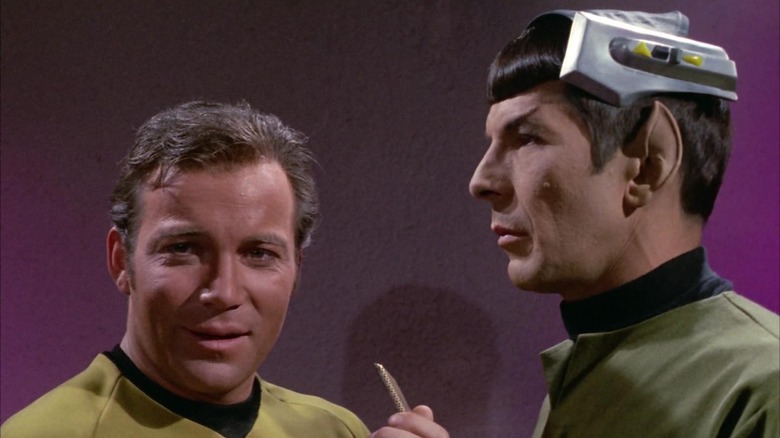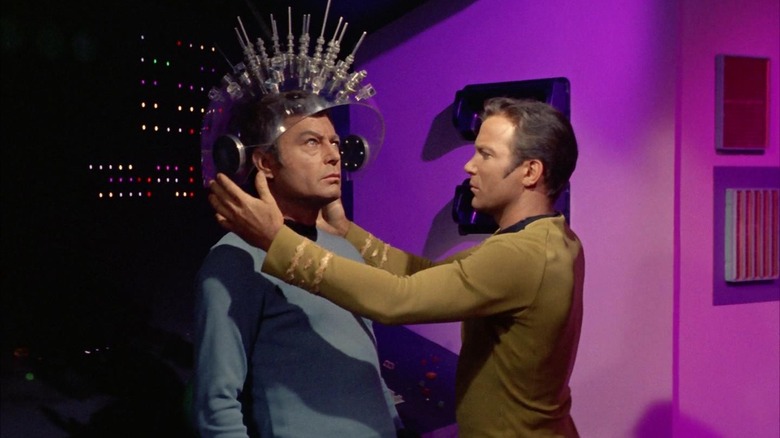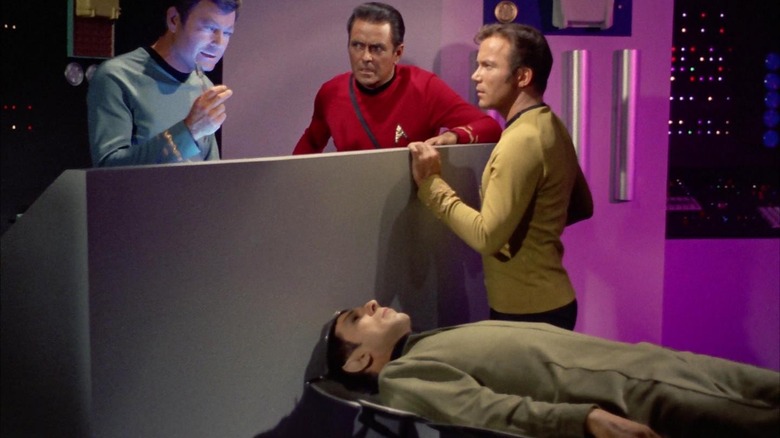Star Trek's Infamous Spock's Brain Episode Was A Sneaky Dig At NBC Itself
Often considered one of the worst episodes of "Star Trek," "Spock's Brain" (September 20, 1968) boasted a story wherein a species of low-intelligence aliens infiltrate the U.S.S. Enterprise, sedate everyone on board, and steal the grey matter belonging to Spock (Leonard Nimoy) for nefarious purposes. It will later be revealed that Spock's brain was required to power a super-computer on a nearby planet and that the computer could temporarily inject complex information and skills into people's heads. The crew of the Enterprise outfit Spock's brainless body with a temporary brain-like machine, and they can pilot him via remote control.
Eventually, Dr. McCoy (DeForest Kelley) will be injected — via the supercomputer — with knowledge of how to surgically return Spock's brain to his body. When McCoy runs out of knowledge partway through the operation, the now-conscious Spock talks him the rest of the way through. "Spock's Brain" is farfetched and silly, even by Trek standards.
"Spock's Brain" was directed by Marc Daniels, and he is not particularly proud. In the oral history book "Captains' Logs: The Unauthorized Complete Trek Voyages" edited by Mark A. Altman and Edward Gross, Daniels and longtime Trek writer David Gerrold talked about "Spock's Brain" and they concluded that the episode was meant to function as a wry satire, a goose to the serious-minded NBC execs — or perhaps Gene Roddenberry himself — who were all taking the show too seriously. William Shatner also noted the episode's symbolism in his 2009 autobiography "Up Till Now." Surely, Shatner thought, something was being stated outright in a story about a machine searching for a brain.
The silliness of Spock's Brain might have been the point
Daniels noted that the first draft of the "Spock's Brain" teleplay left Spock on the Enterprise while the other characters located his missing brain. Daniels was the one who decided to turn Spock into a mechanical zombie who came along. "Then the concern was whether or not he would look like a zombie walking around. Thankfully Leonard was able to pull it off." And, yes, Nimoy wasn't a stiff-armed zombie, although he did still look a little silly.
And, according to Gerrold, the silliness might have been the point. Gerrold suspected that the episode's writer, Gene L. Coon (credited as Lee Cronin) was trying to confront Gene Roddenberry's tendency to take "Star Trek" seriously to the point of it being no fun. Gerrold posited:
"I suspect [...] that 'Spock's Brain' was Gene L. Coon's way of thumbing his nose at Roddenberry or something. If not Roddenberry, he was thumbing his nose at how seriously the show was taking itself. I suspect what had happened is that they were a little panic-stricken because there weren't a lot of scripts to shoot. The history of 'Star Trek' is management by crisis. I think somebody called up Gene L. Coon and said, 'We need a script in a hurry, can you do it?' And he did it under a pen name, and I don't think he deliberately set out to write that show seriously."
As such, Gerrold laid out what he suspected was Coon's thought process: "I don't think there's any way you can take that episode seriously. You've got to take it as a joke. What's the stupidest science fiction idea to do? What if somebody stole Spock's brain?" This was a premise that could have been cribbed from a low-budget sci-fi horror thriller from 1953.
Star Trek was suffering at the time
Gerrold felt that Coon definitely would have tried something that playful, saying: "I think Gene L. Coon had that kind of sense of humor to do that kind of impish stuff. He had an irreverent sense of humor, and I think he wanted to poke 'Star Trek' because someone was taking it too seriously. " Possibly Roddenberry, but also possibly the NBC higher-ups. It's okay to have fun. "Maybe it was his way of not buying into it," Gerrold said.
Shatner's memories of "Spock's Brain," meanwhile, were an indicator of the show's suffering. He recalled that "Star Trek" was moved to a Friday 10 p.m. timeslot, which is death for any series. Shatner was, at the very least, jocular about the plight, writing:
"Our first show that third season might have been a tribute to the NBC executives who so mishandled this show: it was about a society in desperate need of a brain. It was entitled 'Spock's Brain' and took place on Stardate 5431.4. I don't know what day of the week that would have bee, but I can assure you it was not a Friday night at ten o'clock. Because even aliens are busy Friday nights at ten o'clock."
Shatner also tells a cute (made-up) story of how Nimoy was lying on his operating gurney during the episode's final surgery scene, only to open his eyes in surprise, and, in a panic, yell "Friday night at 10 o'clock??" "Perhaps he didn't," Shatner impishly wrote, "But it was true, of course."
Trek struggled through its third season with a slashed budget, forcing them to eliminate guest stars and location shoots. After its third season ended, "Star Trek" was no more.
It's possible, however, that "Star Trek" lived on somewhere.


